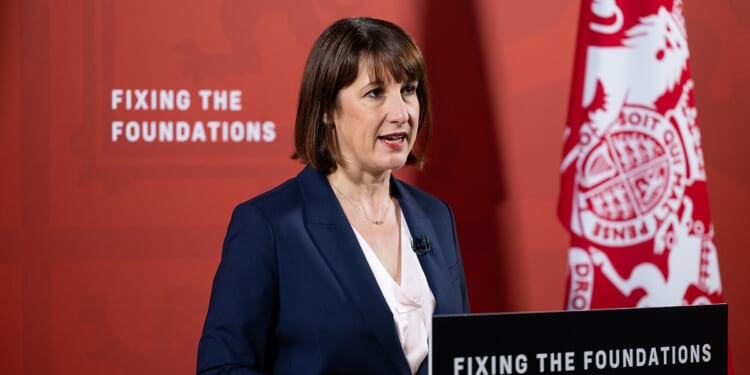Sir John Redwood is a former MP for Wokingham and a former Secretary of State for Wales.
Rachel Reeves has gone for the Ground Hog day budget. Just like last year she allows two months of intensely damaging speculation of tax rises to come. She accepts that public spending can only go up, and battles to get her numbers into line with a five-year OBR forecast that is bound to be wrong; no wonder she is miserable and the economy stumbles yet again.
Confidence is low and damaged by endless speculation that anyone and any business that could save, invest and earn more is some kind of villain that has to be taxed into submission and poor performance. Meanwhile the rich and energetic head for the exit.
So how to break out? I am certainly not recommending borrowing more, driving our rates still higher and making markets mad. She must begin by spending cuts.
Not by hitting the NHS, or robbing the disabled and pensioners. Start with the grotesque losses of the Bank of England, running at around £23bn a year. Tell them to stop selling bonds at a loss and to have some margin between lending and borrowing rates like the European Central Bank. That could save £10bn or more next year.
Next, cancel the ridiculous give away of Chagos with a dowry, saving maybe £30bn over the next century but sending a signal of better financial management. Tell the railways their losses and subsidies are too high – and get them to lose £2bn less next year for starters. Demand the Post office has a proper business plan to end the losses altogether next year or else to cut its costs.
There are many other obvious excesses and waste to be cut out: adopt the Conservative amendments to the Immigration legislation to stop more of the boats next year and slash the hotel bills; tell DWP to stop granting so many people sick notes for life, which has become a surge of young people being written off and placed permanently on the state; and so on.
Reeves’ main objective must be to tackle is the big loss of public sector productivity since 2019. It costs the state more than £25bn extra to deliver the same services as in 2019, before adding in all the extra money to allow for inflation of wages and costs. Notice the symmetry between the avoidable extra costs of public services and the size of the likely deficit (or ‘black hole’) she is trying to fill; get Britain working as well as in 2019 and the black hole vanishes. That leaves the other cuts in spending to help get the deficit down and to allow some growth promoting tax cuts.
So how do you return productivity to six years ago? The Government seems to think you need to spend an extra £3.25bn on AI investments, and then in maybe four or five years time you get back to 2019 levels. Why do they accept that nonsense? In 2019 there was no AI; the restoration of productivity to 2019 levels requires no new AI. Any AI investment plans need to set out how they will give a supercharged boost to productivity on top of restoring it.
Indeed, merely asking to restore it is a low bar. You would expect in a modern organisation that has been spending liberally on computers and automation since 2019 that the productivity level would now be well above that distant mark.
Ministers and the Civil Service should know how they got productivity up to modest 2019 levels as they did it once before.
Clearly it needs fewer people to carry out current tasks. The starting point should be a comprehensive freeze on any new recruitment from outside, save for medics, teachers, and uniformed personnel where there are shortages.
As people retire or move to another job outside the public service, so you amalgamate or remove posts; this gives more opportunity to existing staff to get promoted and to become better paid. Ministers should require remodelling of bonus schemes so they are linked directly to better quality and more output benefitting service users. There needs to be reining back on internal, inward-looking tasks and a reduction in manager level posts as people leave. Natural wastage may deliver around a seven per cent staff cost reduction a year which will soon tackle the productivity drop.
We are talking about working smarter, not working harder or longer hours. Quality and efficiency are the two sides of the same coin, not an either or. Get things right first time and you need a smaller complaints department and have less waste.
Reply promptly to queries and complaints and you save on all the holding replies and further complaints about your delay and failure to care; get benefit and subsidy entitlements properly calculated and you save money on error and fraud; release the right people from prisons and you spare the police the task of finding and arresting the ones you wrongly let out; protect patients from hospital acquired infections by good hospital cleaning regimes and you spare treatments for those infections.
Raise morale in the department by getting things right more often so people want to come to work and are proud of the place. Get absenteeism down, which is much higher in the public than in the private sector, by creating a mood of success which cuts down on an angry public wanting to complain.
I want to believe there is a public sector ethos which is good and based around serving the public well. The danger in parts of the public sector is an ethos of self-serving defensiveness, covering up mistakes and demanding more money for any problem. If Reeves and Sir Keir Starmer turned their mind to great public sector leadership they could cheer up the officials, impress the public with better service, and get the costs under control.
Instead, an absentee prime minister takes every opportunity to spend time on the problems of foreign countries in far away places, whilst the Chancellor is undermined by briefing and the suggestion that others are aiming to dictate her budget. That is not the way to run a successful enterprise.








![Florida Officer Shot Twice in the Face During Service Call; Suspect Killed [WATCH]](https://www.right2024.com/wp-content/uploads/2025/12/Inmate-Escapes-Atlanta-Hospital-After-Suicide-Attempt-Steals-SUV-Handgun-350x250.jpg)

![Keith Ellison Caught Promising to Fight State Agencies for Somali Fraudsters [WATCH]](https://www.right2024.com/wp-content/uploads/2026/01/Keith-Ellison-Caught-Promising-to-Fight-State-Agencies-for-Somali-350x250.jpg)






